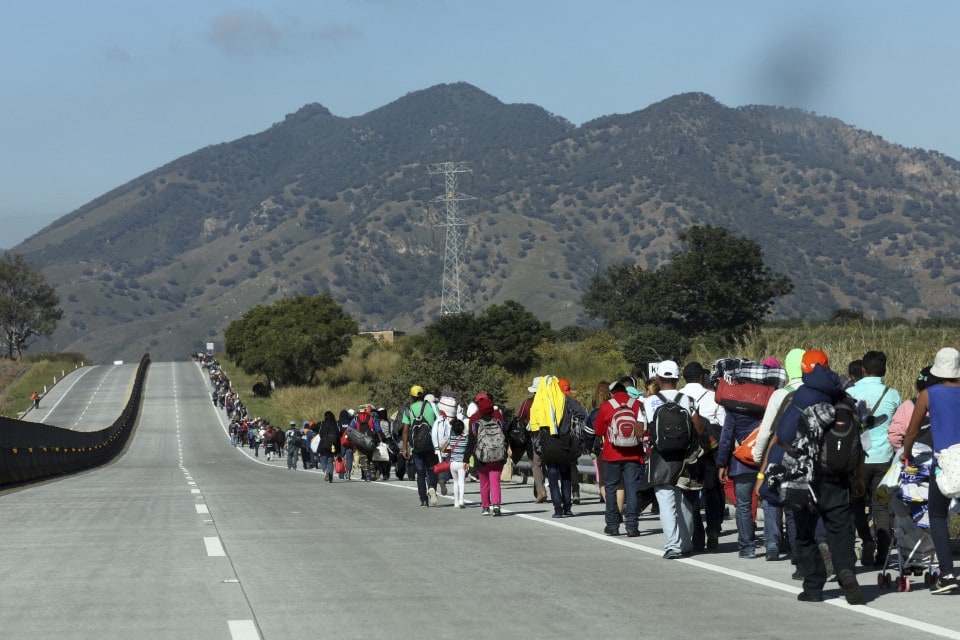Rick Barton is a lecturer at Princeton University and the author of “Peace Works – America’s Unifying Role in a Turbulent World.” He served as assistant U.S. secretary of state from 2011-2014 and as deputy high commissioner for the UN Refugee Agency from 1999-2001.
As the first arrivals from the latest Central American caravan reach the U.S. southern border, it is high time for the Trump administration to move from crisis mode to pro-active planning.
To begin, Washington must acknowledge the gang war that is engulfing Central America. The region sees some of the highest homicide rates in the world, and many of those fleeing their homes are driven north by this violence. They have a “well-founded fear of persecution” and thus qualify as refugees. Washington must give them the protections and rights of the international agreements it helped create.
This will not produce a northward rush of Central American migrants as the current administration so fears. In 2014, after a wave of migrants from the region traveled to the United States, driven by the violence in their countries, Washington began to grant a few of them refugee status, and no such additional surge occurred. Nevertheless, in June of this year, then-Attorney General Jeff Sessions reversed the Obama-era policy.
In addition to treating migrants with dignity, the United States must address the root cause of the migration: the violence. One way is to encourage Central American governments to broker more peace deals between rival gangs. Back in 2012, I met with El Salvador’s minister of security, David Munguia Payes. A former general and now minister of defense, Munguia Payes was known as a “mano dura,” a hardliner. He spoke about the “war” between the two major gangs and supported a negotiated truce. It was of course an imperfect deal and it held for only 18 months. But during that time, it reduced homicide rates from 15 per day to less than five and is credited with saving over 5,000 lives.
Alongside this top-down approach, the United States must mobilize citizens and local civil society to reestablish public safety. In Honduras, the United States started partnering in 2012 with the Alliance for Peace and Justice, a coalition of dozens of civil society groups. During this time, Washington helped the alliance report and collect data on the violence, vet and purge the police force of corrupt officials, generate momentum to replace a lackluster attorney general and implement new laws for safer streets. During the 2013 Honduran presidential race, the U.S. assisted local groups in building television and radio campaigns to pressure candidates to focus on crime.
Through complimentary initiatives, there are now 25 community centers across Honduras that provide safe spaces and programming for young people. In Tegucigalpa’s most crime-ridden neighborhood, the United States assisted citizens in partnering with police and prosecutors to build upon a witness protection program, which led to an 85 percent homicide conviction rate. Throughout the region, the United States backed land registration of the disempowered to counter the prevalence of violent, illegal seizures of private property.
All of these initiatives are positive steps forward, but they need expansion. Those who lead these efforts are only a few and they often become targets of established forces. Take the extra-judicial killing of indigenous organizers in Guatemala, seeking to protect their historic lands. The government has yet to pursue those who murdered them.
The United States could help in this matter. Five years ago, when I was assistant secretary of state, the State Department’s Bureau of Conflict and Stabilization Operations supported the prosecution of high-profile crimes in Honduras. We know how to do this, and we also have the technical expertise of skilled professionals from neighboring countries to guide us. At the same time, the United States should condemn military officials and members of law enforcement who prey on dissidents, as well as restrict the travel of their family members to the United States.
Similarly, the United Nations’ independent impunity investigatorin Guatemala, Iván Velásquez Gómez, has done great work, only to be banned by the current government. Thanks to his work, for the first time, high ranking officials were convicted. In another case, a sitting president at the time, Álvaro Colom, was exonerated after being framed for murder. These efforts led to meaningful criminal justice reforms, anti-corruption laws and high security courts for the prosecution of powerful individuals, among others. The United States should announce its support for these initiatives while looking to expand them across the region.
Finally, the United States must restore the rule of law at its own borders, starting with the processing of over a half million pending asylum claims. This is justice delayed. Let’s call on the UN High Commissioner for Refugees and the International Organization for Migration to assist with the backlog. Let’s mobilize our own civil society to move families of asylum seekers from detention centers and private prisons to private homes by promoting and subsidizing “Host a Family” programs, at a fraction of the $300 or more per day that it costs to detain them. The United States could also join with Mexico’s new government to expand temporary worker programs.
There are so many good options. Combining American ingenuity with local initiatives, and enforcing the rule of law, will reduce violence in the region. That should spare us more chaos and discord within our country.
This was produced by The WorldPost, a partnership of the Berggruen Institute and The Washington Post.





